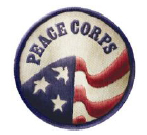Branding the Peace Corps — President Obama allowing agency to change logo
FROM USA TODAY
BY GREGORY KORTE
APRIL 11, 2016 WASHINGTON — President Obama, often criticized by Republicans for constitutional overreach for his use of executive orders to get around Congress, signed the 254th executive order of his presidency Friday — allowing the Peace Corps to change its logo.
In his seven years in office, he’s also used executive orders to change the name of the National Security Staff to the National Security Council staff, to allow the President’s Council on Physical Fitness and Sports to also consider the role of nutrition, and to prohibit government employees from texting while driving.
And, showing that executive orders can attend to even the smallest details, Obama signed an executive order in 2014 to correct a typographical error in a previous executive order — which governed the format of executive orders.
Executive orders are often thought of as the most muscular form of presidential authority. And in some cases, they are. Executive orders can declare national emergencies, impose sanctions on other countries, set federal purchasing policies, and dictate the working conditions for 3 million federal employees.
But more often than not, they deal with more mundane matters of bureaucracy.
“Particularly since Bush, this notion that every executive order constitutes an imperial power grab by the president — it just doesn’t match up with the facts on the ground,” said William Howell, a University of Chicago professor and author of Politics Without Persuasion: The Politics of Direct Presidential Action.
“It’s not all power grabs. A lot of it is clearly trivial stuff,” he said.
That’s one reason why simply counting the number of executive orders issued by a president is a poor measure of how sweeping his use of executive power is. So while President Obama has noted that he’s issuing fewer executive orders than any president in 100 years, it’s debatable how many of those executive orders encroach on the power of Congress.”It is not so much the number of executive orders but executive orders that are in direct violation or in opposition to the intent of the Congress,” saidSen. Pat Roberts, R-Kan., in a debate over the closure of the Guantanamo Bay prison last year.
To figure out how many executive orders are truly significant. Howell has looked at mentions of executive orders on the front page of The New York Times, in court decisions and the congressional record. He estimates that only 10% to 15% of executive orders have significant public policy implications — a proportion that’s increasing over time as presidents issue fewer executive orders overall.
And most executive orders — perhaps 60%, according to a study byBowdoin College professor Andrew Rudalevige — aren’t even written by the White House.
“A lot of these orders are formulated in a department or in an inter-agency process, and they make their way up rather than down,” Rudalevige said. “Often the departments are ordered to do things that they’ve asked to be ordered to do.”
That appears to be the case with the executive order Obama signed Friday. Under a 1979 executive order by President Carter, the president alone has the authority “to adopt and alter an official seal or emblem of the Peace Corps.” So unless Obama wanted to personally sign off on the new design, the Peace Corps needed to ask for the legal authority to do it themselves.In a report to Congress Friday, the White House said the Peace Corps executive order would allow “more robust brand protection as the agency pursues communications and volunteer recruitment campaigns and future strategic partnerships.” Peace Corps Press Director Erin Durney said the agency was looking forward to making changes in the emblem in the future.
FYI: On Wednesday evening, April 20, from 5:00 to 7:00, the Peace Corps Director is having a “celebration and preview of the new Peace Corps branding” for invited guests in the Director’s Conference room at the Headquarters in Washington, D.C. This event will include a presentation of the brand platform, website design and visual identity, followed by a reception. — John
Office of the Press Secretary
For Immediate Release
April 08, 2016
Executive Order — Amending Executive Order 12137
AMENDING EXECUTIVE ORDER 12137
By the authority vested in me as President by the Constitution and the laws of the United States, including section 19 of the Peace Corps Act, as amended (22 U.S.C. 2518) and section 301 of title 3, United States Code, it is hereby ordered as follows:


Having read this, I wonder why I read this…. 🙂
Ken, my thoughts exactly. And the logo change is a priority because?..